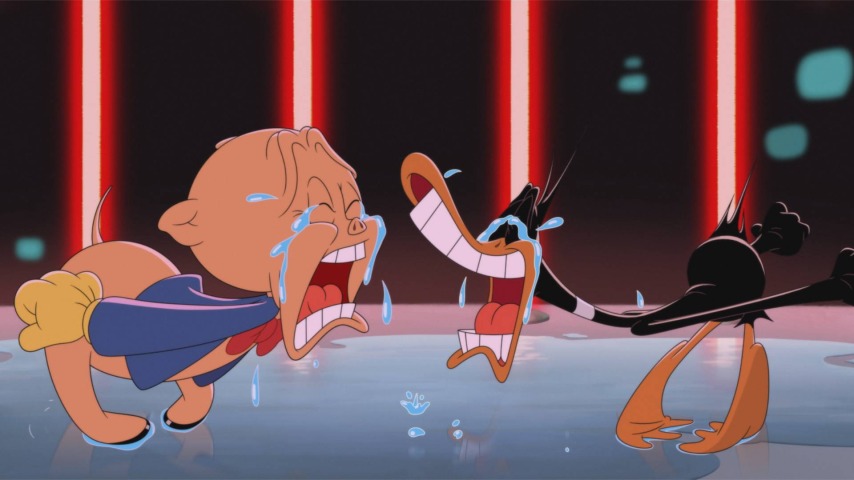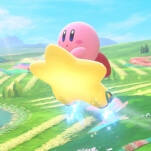In the ’90s and 2000s, Looney Tunes had a spike in popularity with the hybrid live-action/animated features Space Jam and Looney Tunes: Back In Action. But the heavy output of the “Termite Terrace” era of animated short production, defined by the work of directing legends Tex Avery, Frank Tashlin, Chuck Jones, Friz Freleng, and Bob Clampett, has never been reproduced at Warner Bros. Animation.
The most recent approximation of that kind of full-time job at Warner Bros. Animation working with the classic characters came in 2019 with the Max shorts series Looney Tunes Cartoons. Developed by The Day The Earth Blew Up director Pete Browngardt (Uncle Grandpa), the series was a dream project for the veteran animator, who grew up on the Looney Tunes shorts and produced 82 episodes featuring three new shorts each over six seasons.
Browngardt tells The A.V. Club that, at the time, Warner Bros. wanted to take advantage of the renewed interest in the characters that came out of Space Jam: A New Legacy—to make a push to bring Looney Tunes back into the culture. “It had been dormant for a while,” Browngardt says. “They were not re-running the old shorts as much and [awareness] was sort of falling off.”
He says his pitch for the 2D-animated Looney Tunes Cartoons—which featured characters from all eras of the library—was not to change a thing about what makes those original shorts so memorable. “I said, ‘I would try to be beholden to the classic sensibility and tone of the original shorts as much as you possibly can in this modern era,’” Browngardt explains. “They went for it and we went into development, and got a green light very quickly. They just gave us money to start making shorts even though we didn’t have a deal in place, as far as where they were gonna end up. But my reverence for the old shorts, I think, was the torch in the distance, the lighthouse that I was following.”
While the Golden Age of the Looney Tunes shorts era lasted four decades, Browngardt says he and his fellow animators were grateful to get four years together to study, dissect, and figure out how to capture the spirit of what came before. And it ended up being the perfect preparation for when he was asked by executives if he had any ideas for a long-form project using the characters.
“Initially I was like, ‘I don’t know how you do a movie,’” Browngardt remembers. “I understand why they do the Space Jam thing, because how do I satisfy all of the Looney Tunes [characters] in one movie? That’s what they always want. But then I said, ‘What if it wasn’t that?’”
Instead, Browngardt says he leaned into what he wanted to see in a feature-length Looney Tunes movie, rather than what Hollywood would make. “I came up with a Porky Pig/Daffy Duck Ed Wood movie,” he laughs. “I wanted to do a ’50s B-movie starring Porky and Daffy in an alien invasion movie.”
With the studio pleased with the quality and reception of the Looney Tunes Cartoons, Browngardt says in 2021 he was approved to co-write a screenplay with Kevin Costello in order to sell the movie. “I knew I didn’t want to make a movie that felt like it was in a time capsule of 1940. But I wanted to be reverent to that and inspired by that, to make it look like that but have a contemporary pace to it and humor as well. So, I did a bunch of vis dev and some mood boards and stuff, and they went for it. We pitched it to HBO Max, and we got the green light to go into production.”
“I think they felt like it was the next progression,” Browngardt says of the studio’s decision to invest in new Looney Tunes storytelling. “They looked down the road and went, ‘We’ve got this great crew. How do we keep them together?’”
Production began on The Day the Earth Blew Up, and a lot of the Looney Tunes Cartoons team came aboard. Yet even with studio support, Browngardt says there was a lot of second guessing happening from the higher-ups. “Probably the biggest challenge and hurdle to overcome, for myself and for many people on the crew and for the executives—even before we started drafting the script and figuring out the story—was that emotional story,” he says of the novel way they wanted to portray Porky and Daffy. “We knew we needed that relationship to play right to get people invested, or they’re not going to want to watch 90 minutes of Looney Tunes. And that’s the thing that is new to the brand of Looney Tunes, was taking these iconic characters that are known for just their gag shorts and making them tell a larger story.”
“It’s partly one of the reasons why I picked Porky and Daffy, because with Bugs and Elmer it’s more predator/prey,” he continues. “With this one, there is a history and a legacy of them being friends, roommates, and buddies, and that inherently speaks to the buddy-comedy tradition. Also, I didn’t want to go, at the end of the movie, it’s the new Daffy Duck! He’s changed! I wanted them to have an experience in the story, and be affected by each other in the sense that they can learn something, but I didn’t want them to change. That’s a hard thing to tell Hollywood executives that read Save The Cat and Syd Field and all those books where a character has to change and be a new thing.”
As if talking to the execs wasn’t hard enough, in 2022, WarnerMedia’s merger with Discovery Inc. created WBD and the subsequent restructuring was immediately felt in all divisions, including animation. As a first-time director, Browngardt admits it was rough. “It’s already hard enough to make a movie, any type of movie, but then you’re making an animated, 2D movie with classic Looney Tunes.”
Morale took a hit. “Everyone was nervous,” Browngardt says. “We had people leave because of that. They tried to take other opportunities because they were unsure about the future at the studio. I tried to stay positive. As the leader, I was saying, ‘Look, we’re working today. We’re making a movie today. We’re going to do the best job we can do today. We have no control over what happens with that side of things, but we can control what we’re doing, and that’s what we do. We take it day by day and we keep pressing forward. They haven’t turned the lights off yet, so we just keep going.’”
At one point, Sam Register, president of Warner Bros. Animation, called to say he wasn’t sure if they could finish the movie: “Sam was very open and communicative about the business side of things, going, ‘Look, we’re still afloat, but there’s a lot of conversations happening and we’re trying our best to keep this going.’”
Towards the end of production, they were running out of money, which meant they couldn’t send boards to some of their established animation studio partners, and needed to go with cheaper alternatives. But they finished it, thanks in part to that familiar in-house team.
But in August 2022, WBD reversed their decision to release The Day The Earth Blew Up. However, unlike the fate of Coyote Vs. Acme, WBD let Register and Browngardt shop the finished film around for new distribution. “Our saving grace at the end of the day was our cost,” Browngardt says. “Our budget’s about $15 million dollars and that’s peanuts in the grand scheme of things, especially for the quality of the film. I also think the film is strong. Those two things worked for us. To their credit, they let us shop it, even though when we shopped it, not many were interested in it, even at that time. There’s a lot of fear in Hollywood. There’s never a guarantee, even when you’re a huge name, and 2D was a big turn-off.” GFM Animation tried to sell the film in 2023, but it wasn’t until June 2024 that Ketchup Entertainment swooped in and gave it a theatrical chance.
Now the future of the Looney Tunes, for the short term at least, is in the hands of animation fans who make a point to show up for The Day The Earth Blew Up. “This is the first real, ‘Let’s go out and see a Looney Tunes movie’ that feels like the Looney Tunes,” Beck says. “It has a story with highs and lows, heart, crazy humor, wild graphics and some of it is groundbreakingly different. I’d like to think that the template for what could be is there now. It’s possible it won’t do anything in the theaters. But even if it doesn’t do anything in theaters, which I hope it does, I think it will be discovered just like The Iron Giant was discovered.”
Browngardt admits he’s going to need more time for true clarity on everything regarding the project, but he feels like they made an entertaining Looney Tunes movie, and that was their goal. “That should be the goal for all this stuff, even if it’s niche stuff. Listen, if we can triple the money of the budget, maybe they’ll be interested in making some other 2D, 90-minute Looney Tunes movies, which I’d love to be involved with. [Regardless], I can’t reiterate this enough, every name you see in the credits feels exactly how I felt making it. We all love this stuff, especially the board guys and the designers. Some of the people on this crew are [animation] veterans who waited their whole life for this to happen. It’s really special and I didn’t take that lightly. I love this art form, and it’s important.”
As for where the Tunes go next in this landscape, Beck says they will endure. “If you look at the whole of Warners Bros. [Animation], they never stood still. They evolved with time. They made the characters funny for the time that they were living in.”
“There might be a lull, but I don’t think so. The brand is too big. They’re going to make new Looney Tunes. But they may not look like this,” he says of Browngardt and his current collaborators’ vision. In the meantime, the classic Looney Tunes shorts are on Blu-ray and the new terrestrial channel, MeTV Toons (both more reliable options than what’s available on WBD’s streamer Max).
Whether Browngardt gets another swing with these characters, or it involves new talent, he says the thing to remember about the Looney Tunes is that they remain perfect as they are. “You’re working with these stars,” he says. “You just facilitate. You don’t change the characters. You don’t reinvent the characters. There’s no reinventing involved. You have to approach them as strong characters with amazing personalities and incredible comedy engines already built into them. But the language of Looney Tunes, cinematically, is so unique that it’s just waiting for people, like a playground, to go in and play. That’s something I’d love to see.”









































